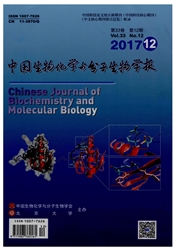

 中文摘要:
中文摘要:
以长白猪(73),大白猪(68),沂蒙黑猪(57)和莱芜猪(83)为研究对象,采用PCR-SSCP方法对猪MyoG基因遗传多态性进行分析,并研究基因型与初生重、日增重、肌肉嫩度和背膘厚的相关性.根据猪MyoG基因的DNA序列(M14331)设计引物,结果在内含子1扩增的片段上发现了一个多态性,检测到2个等位基因(A、B),3种基因型(AA、AB、BB),并对纯合子进行测序,发现2943位G→C突变.基因型在不同猪种分布的多重比较,结果表明,大白猪与长白猪、沂蒙黑猪和莱芜猪比较差异显著(P〈0.05),莱芜猪与长白猪和沂蒙黑猪比较差异显著(P〈0.05),长白猪与沂蒙黑猪比较差墨丕垦羞(P〉0.05).固定效应模型分析结果表明,初生重及嫩度基因型间差异显著(P〈0.01),而日增重及背膘厚基因型间差异不显著(P〉0.05).最小二乘分析结果表明,BB基因型个体与从基因型个体比较肌肉嫩度的差异显著(P〈0.05),AA基因型个体与AB和BB基因型个体比较背膘厚的差异显著(P〈0.05).因此,推测MyoG基因对猪肉品质、生长速度及背膘厚存在一定的影响,将MyoG基因应用于猪育种过程中的标记辅助选择将可以改善猪肉品质,提高生长速度,加快猪的育种进程.
 英文摘要:
英文摘要:
Single-nucleotide polymorphisms of the MyoG gene were tested using PCR-SSCP from 73 Landrace pigs, 68 Large White pigs, 57 Yimeng pigs and 83 Laiwu pigs. The effects of the MyoG gene on the birth weight, the average daily gain, the meat tenderness, and the backfat thickness were also analyzed. On the basis of the DNA sequence (M14331) of the porcine MyoG gene, primers were designed to amplify MyoG gene. One polymorphism was found in the amplified region of intron 1, in which two alleles (A, and B) and three genotypes (AA, AB, and BB ) were examined. A G--~ C transition was detected at 2 943 locus by sequencing the homozygotes. The results show that: (1) The Large White breed differed significantly (P 〈 0.05) in genotype distribution from the Landrace, the Laiwu and the Yimeng breeds; and the Laiwu breed differed significantly( P 〈 0.05)in genotype distribution from the Landrace and the Yimeng breeds;whereas no significant differences( P 〉 0.05) were found in genotype distribution between the Landrace and the Yimeng breeds. (2) On the basis of the fixed effect model, significant differences ( P 〈 0.05) were found in the birth weight and the tenderness among the different MyoG genotypes, whereas no significant differences (P 〉 0.05) existed in the average daily gain and the backfat thickness. (3) Using least square analysis, it was seen that significant differences ( P 〈 0.05) exist in the meat tenderness between the individuals of the BB genotypes and those of the AA genotypes ; and significant differences ( P 〈 0.05 ) were found in the backfat thickness compared the pigs of the AA genotypes with the pigs of the AB, BB genotypes. These results suggest that the MyoG genotype has significant effects on the meat quality, the growth rate, and the backfat thickness, therefore MyoG gene can be used in marker-assisted selection to improve meat quality and growth rate, and to accelerate the breeding progress.
 同期刊论文项目
同期刊论文项目
 同项目期刊论文
同项目期刊论文
 期刊信息
期刊信息
